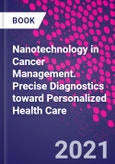Nanotechnology in Cancer Management: Precise Diagnostics toward Personalized Health Care provides a well-focused and comprehensive overview of technologies involved in early stage cancer diagnostics via the detection of various cancer biomarkers, both in-vitro and in-vivo. The book briefly describes the advancement in cancer biomarker research relating to cancer diagnostics, covering fundamental aspects of various techniques, especially transduction methodologies, such as electrochemical, optical, magnetic, etc. In addition, it describes approaches on how to make options cost-effective, scalable for clinical application, and user-friendly. Advancements in technology related to device miniaturization, performance improvement and point-of-care applications round out discussions.
Final sections cover future challenges, the prospects of various techniques, and how the introduction of nanotechnology in cancer management in a personalized manner is useful.
Please Note: This is an On Demand product, delivery may take up to 11 working days after payment has been received.
Table of Contents
1. Introduction: Background, diagnostics, cancer biomarkers, state-of-art
2. Electrochemical Detection: CV/DPV/Impedance
3. Fluorescence microscopy: Organic dye/nanoparticles/quantum dots and spectroscopy
4. Raman spectrophotometer: SERS nanotags (Au/Ag), confocal Raman microscopy
5. Sequencing: DNA analysis
6. Bioinformatics: Computer programming
7. Magnetic: Magnetic based sensing
8. Lab on a chip: Microfluidics
9. Imaging: Electron microscopy (AFM/SEM/TEM): Shape and size-based analysis
10. Scale up of rapid diagnostics for clinical application: Device development for clinical application
11. Challenges and future prospects of nano-enabled cancer management
Authors
Kamil Reza Khondakar School of Science,, Woxsen University, Kamkole, Telangana, India.Dr. Kamil Reza Khondakar is a senior assistant Professor at Woxsen University, Hyderabad, India. He earned his Ph.D. from the Australian Institute for Bioengineering and Nanotechnology at The University of Queensland, Australia, where his research centered on developing microfluidic assays for detecting cancer biomarkers. He has edited 3 books and authored over 50 international research publications in the fields of lab-on-a-chip technology, electrochemical sensors, optical sensors, and machine learning assisted sensors for the advancement of personalized healthcare systems. He is also serving editorial roles for journal Frontiers in nanotechnology and Sensors (MDPI). He was awarded the Startup Research Grant (SRG-2023) by the Science & Engineering Research Board (SERB), Government of India, to develop microfluidic chip-based sensors for detecting water contamination. He also received International Postgraduate Research Scholarship (IPRS) from Government of Australia, and University of Queensland Centennial Scholarship (UQCent) from The University of Queensland, Australia. He was invited speaker at international conferences in USA, Australia and India. He has been affiliate member of the Royal Society of Chemistry since 2024 (invited).
Ajeet Kumar Kaushik Associate Professor of Chemistry, NanoBioTech Laboratory, Health System Engineering, Department of Environmental Engineering, Florida Polytechnic University, USA.Dr. Ajeet Kaushik is Associate Professor at the NanoBioTech Laboratory, Department of Environmental Engineering, Florida Polytechnic University, USA. He is the recipient of various reputed awards for his service in the area of nano-biotechnology for health care. He has edited seven books, written more than 100 international research peer reviewed publications, and has three patents in the area of nanomedicine and smart biosensors for personalized health care. In the course of his research, Dr. Kaushik has been engaged in the design and development of various electro-active nanostructures for electrochemical biosensor and nanomedicine for health care. His research interests include nanobiotechnology, analytical systems, design and develop nanostructures, nano-carries for drug delivery, nano-therapeutics for CNS diseases, on-demand site-specific release of therapeutic agents, exploring personalized nanomedicines, biosensors, point-of-care sensing devices, and related areas of health care monitoring.








